Over the past six weeks, the Washington Examiner has laid out conservative policies for congressional Republicans and Donald Trump, should he win the presidential election. We’ve called it the Trump Briefing Book, and we’ve looked at areas where America’s greatness appears diminished and innovative policies are needed.
So far, we’ve scrutinized economic insecurity, healthcare, federal debt, energy and education and labor. For this, the final installment, we’re focusing on national security. To look at it thoroughly, we’ve broken it into three areas: military spending, terrorism and the Middle East, and nuclear competitors.
With the help of leading conservative thinkers, we analyze these six big areas and propose solutions for the GOP as it prepares its platform going into the July 18 nominating convention in Cleveland.
If Donald Trump is elected, on his first day in office he will inherit a military that he himself has called “very weak and ineffective” to counter the diverse threats facing the country today.
Republican leaders on Capitol Hill emphasized readiness in their fiscal 2017 defense policy bill, and many analysts say that focus likely will, and should, make up a major part of the GOP platform.
Mackenzie Eaglen, an analyst with the American Enterprise Institute, said she expects the party to grow the active-duty Army, though she said all services could benefit from more personnel.
“There are dozens of examples of readiness challenges that are linked to not having enough people in uniform,” Eaglen said, citing the Navy and Air Force’s maintenance problems. “I think the Navy, Army and Air Force are all too small to different degrees to be sure. They’re each too small to do all that they’re asked of currently.”
The ideal troop strength is about 550,000 active-duty soldiers and about 200,000 active-duty Marines to conduct operations in Europe, Asia and the Middle East, while maintaining a force at home, according to the Heritage Foundation’s James Carafano. The military is set to have 475,000 active-duty soldiers and 182,000 active-duty Marines by the end of this fiscal year.
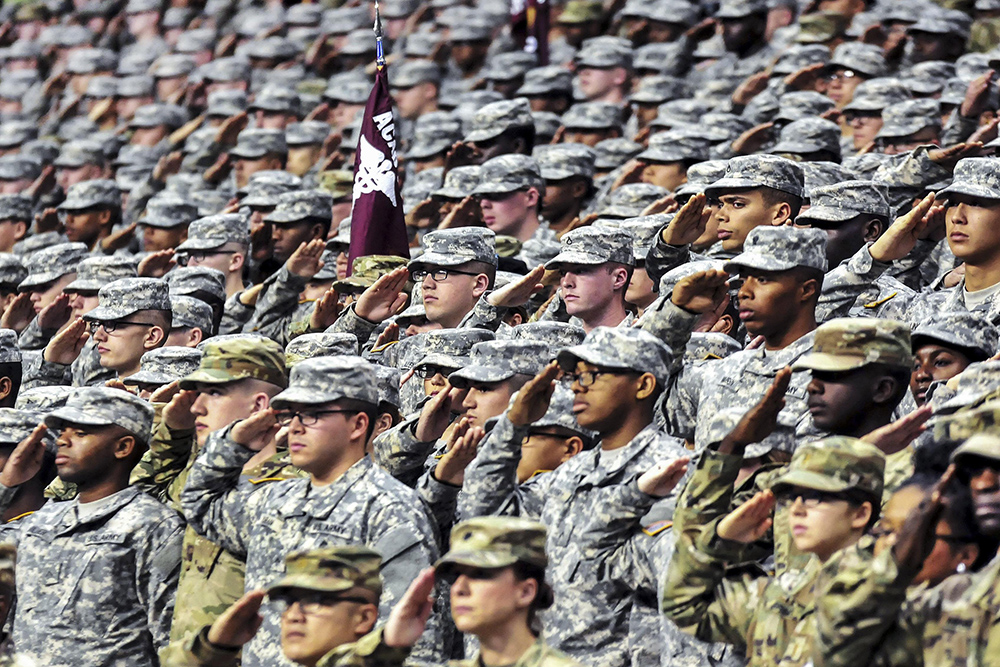
The military is set to have 475,000 active-duty soldiers and 182,000 active-duty Marines by the end of this fiscal year. (U.S. Army)
The military doesn’t just need more people, it needs more platforms, too.
Some Republicans have talked about working toward a 350-ship Navy, and Bryan McGrath, a defense consultant, said that’s a “reasonable number to shoot at,” though it’s possible it should be even higher given the multiple missions the Navy is asked to do in the Middle East, Western Pacific and Europe. The Obama administration, meanwhile, is building toward a 308-ship fleet.
To make any of this happen, the next president will need to deal with how to increase the defense budget while sequestration is still the law of the land and Democrats repeatedly refuse to support a defense increase without a comparable increase in non-defense. Eaglen said the next president of either party will be forced to deal with this, since the Bipartisan Budget Act that provided two years of relief expires this year.
“It’s purely depending on the president. It’s a question mark,” Eaglen said of the chances of repealing sequestration. “I think Donald Trump fully intends to increase defense spending, to put actual dollars toward a higher defense base spending budget. But he doesn’t want to change entitlements … He considers himself a master deal-maker. That’s what it would take to get defense [spending] up.”
Since Trump, and the Republican Party as a whole, is unlikely to tackle entitlement reform, Eaglen said she thinks another “mini” two-year budget deal is a more likely scenario.
McGrath also said the Republican platform should advocate for an “across-the-board increase” in defense spending, about 25 percent more than the country spends today.
But it’s not a problem that can be fixed overnight. Even if the money was there, the U.S. defense industrial base is not “ready to crank up,” McGrath said.
“We have to start today. That’s why it’s so important in the Republicans’ platform,” he said.
Carafano also stressed that a funding increase must look like the slope of an on-ramp, not a sudden jump, since the Pentagon couldn’t even spend that much money if it had it. A gradual increase in funding coupled with multi-year contracts will signal to the defense industry that it’s time to hire, and show the rest of the world that the U.S. is climbing out of its fiscal hole that has led to a lack of readiness in defense, Carafano said.
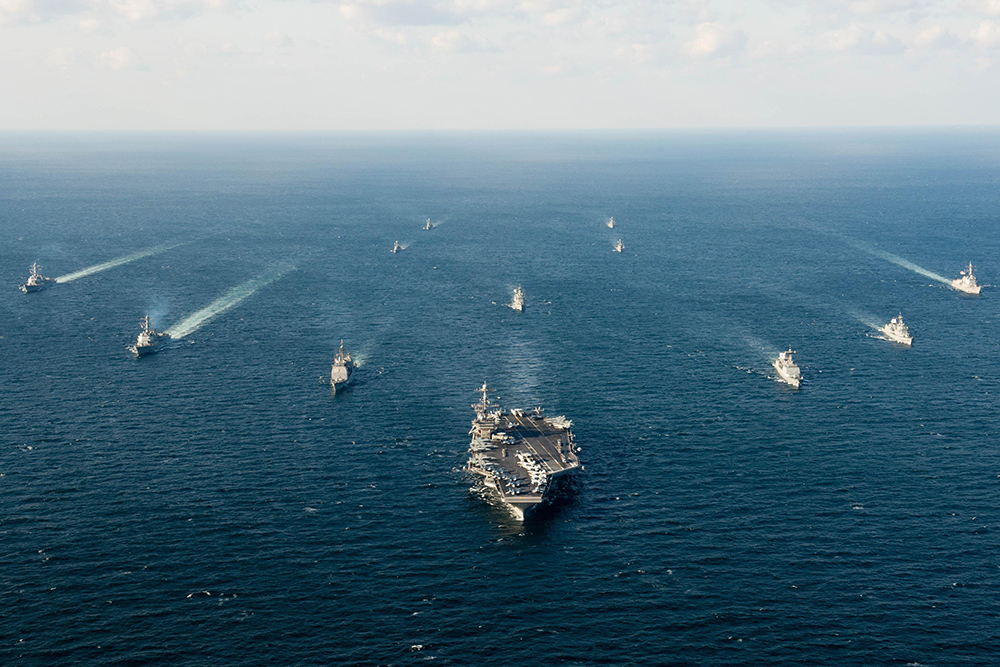
The Obama administration is building toward a 308-ship fleet. (U.S. Navy)
Trump has said he would boost military spending and grow the services if elected to the White House, but has provided few specifics on how he would do so or what a defense budget might prioritize in his administration.
“I’m going to make our military so big, so powerful, so strong that nobody — absolutely nobody — is going to mess with us,” he says in an video on his campaign site.
Carafano suggested that Trump developing specific plans would be a “wasted effort,” since it isn’t useful at campaign events and the state of threats may change dramatically between now and when he takes office.
Under tight budgets, Eaglen said Congress may be “tiptoeing toward” a conversation about base realignment and closure, or BRAC, since money spent on excess infrastructure is money that can’t go toward funding better equipment, training and readiness for the warfighter. While the proposal has so far met resistance on Capitol Hill, Eaglen said a president and Cabinet who make it a priority could get it done.
“Members are more open to BRAC than they have been at any point in the last five years in both parties. It’s still not a majority, not enough to pass Congress yet, but it means the wheels are in motion,” she said.
“If you get a strong [defense secretary] with a White House that backs it, there will be another BRAC in the next administration … If not, you won’t get it. There’s a reason [former Defense Secretary Donald] Rumsfeld got the last round — he was a bully and didn’t let up on Congress.”
Another part of operating in tight budgets is increasing efficiency and eliminating waste to better use the money the military does have. Eaglen said she expects Republicans to continue to focus on acquisition reform at the Pentagon, including how to streamline the purchase of defense platforms and bring new, non-traditional technology into the military more easily.
Where they should be focusing, however, is on reforming how they buy labor and services, instead of platforms, and on initiatives to recruit and retain future service members, she said.
Each of President Obama’s former defense secretaries has criticized the administration for micromanaging the Pentagon, citing a National Security Council that is too involved with operational decisions. While a Republican Congress will likely continue its efforts to shrink the number of personnel on the advisory board, Eaglen said the bigger issue has to do with the personality of the president and who he takes advice from.
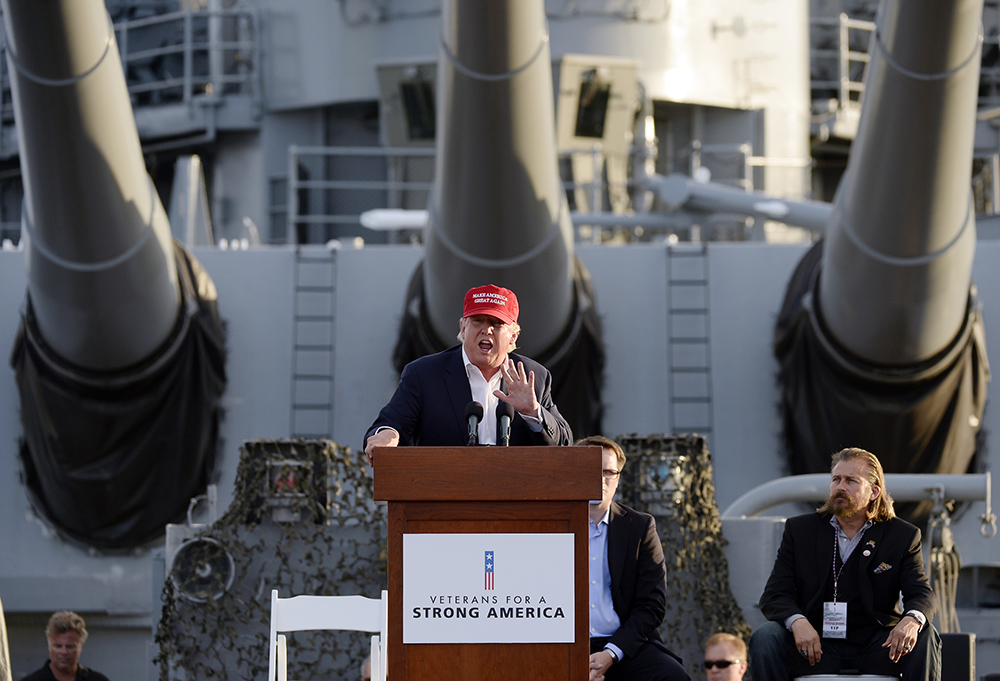
Donald Trump has said he would boost military spending and grow the services if elected to the White House, but has provided few specifics. (AP)
A Trump administration, she said, may not look so different from Obama in this respect.
“Trump has so far proven to be an insular candidate and has taken a lot of advice from top people and his family,” she said. “In theory, we could see an exact replica of the second problem in a Trump White House.”
Many in the Republican Party have opposed Obama’s social changes to the military, including lifting the ban on women in combat, repealing “Don’t Ask, Don’t Tell,” and, recently, allowing transgender troops to serve openly.
While candidates on the campaign trail have talked about their opposition to these things, Eaglen said if a Republican takes over the White House, these programs will be too far along and cost too much political capital to undo.
“There will be no unringing the bell,” she said.
Carafano also said he expects the GOP platform to focus on modernizing the aging nuclear force and dividing burdens between ally countries more evenly, though he doesn’t expect it to repeat Trump’s stance that NATO is “obsolete.”
McGrath, who led the coordination of an open letter from #NeverTrump national security experts, said he’s unsure if Trump will put in the work to make the platform his own as the party’s nominee.
“I think in his view it is a relic of a system that he has blown up, and if he has to send people to a platform committee, he’ll do it, but don’t think he sees it as any constraint,” he said. “I don’t believe that’s the way he’s wired.”
Middle East
National security experts said that as commander in chief, Trump must keep his ego in check, and be open to advice from experts who, in some cases, he has dismissed on the campaign trail as having “perfect resumes but very little to brag about except responsibility for a long history of failed policies and continued losses at war.”
Case in point: the Islamic State.
The recent series of mass casualty attacks either inspired, directed, or just carried out in the name of the Islamic State in Istanbul, Bangladesh, Baghdad, Saudi Arabia, and Orlando, Fla., underscore the increasing urgency in implementing a strategy to hasten the defeat of the terrorist group in Iraq and Syria.
Last November, Trump offered a crude formulation of his general thinking: “I would bomb the s—- out of them,” he told a rally in Iowa.
Retired Air Force Lt. Gen. David Deptula, one of the architects of the air war that brought quick victory over Iraq in 1991, probably wouldn’t say it that way, but agrees with the spirit of what Trump said. He’s argued for more than a year that the current campaign, focused as it is on limiting unintended civilian casualties, is too timid, “more drizzle than thunderstorm.”
Deptula, a renowned air power advocate, maintains the highly restrictive rules of engagement in Iraq and Syria have had the perverse effect of inflicting more misery among the innocents.
“Air forces are being shackled with unwarranted constraints, leaving civilian populations to suffer sectarian butchery. Islamic State influence is now moving outside the territory they control, and it must be stopped.”
While stepping up the air campaign would no doubt be made more punishing, others suggest there are limits to the idea the U.S. and its coalition partners can “kill their way to victory.”
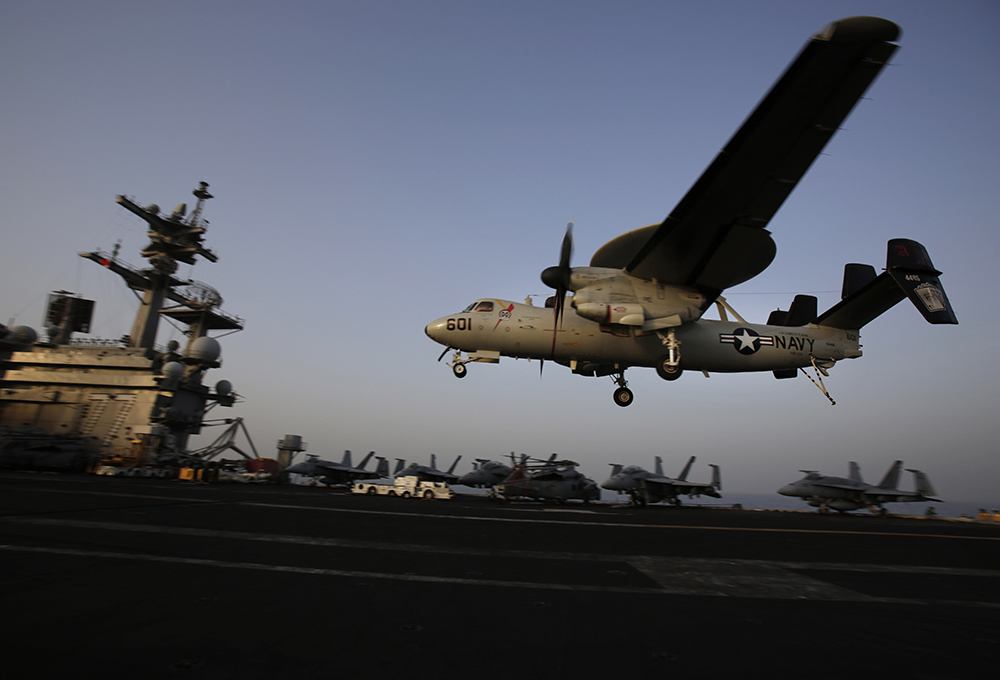
While stepping up the air campaign would no doubt be made more punishing, others suggest there are limits to the idea the U.S. and its coalition partners can “kill their way to victory.” (AP)
Military analyst Harlan Ullman, famous for coining the phrase “shock and awe” during the run-up to the 2003 invasion of Iraq, would counsel Trump to take a harder look at the underlying sectarian tensions that gave rise to the Islamic State, in particular the long-standing animosity between the minority Sunni and majority Shia sects in Iraq.
“So as long as there’s a Sunni-Shia split, you’re always going to have the Islamic State,” said Ullman, who is now a senior adviser at the Atlantic Council and Business Executives for National Security.
Given Iraqi Prime Minister Haider al-Abadi’s failure to bring about any serious political reconciliation, Ullman suggests partition may be the only way to bring peace in an Iraq that would no longer support Islamic State extremists. “I would tend to move to a much more federated Iraq, with Sunni, Shia and Kurdish subdivisions.”
And Trump’s instincts to work with Russia and others to defeat the Islamic State may be a necessary evil, Ullman said. “In Syria, believe it or not, the strongest allies we have are Russia, Iran and the Kurdish Peshmerga,” he said. And while Obama has been unwilling to form an alliance with Russia, Trump should consider it, Ullman said.
“If President Trump were in place, he needs to work with Russia and Iran, and indeed the Kurds, and that’s going to have all sorts of political costs,” he said.
But Deptula insists killing the enemy has a virtue all its own, and argues the next president should unleash the full fury of the U.S. airpower to destroy the Islamic State, without the need for large numbers of ground troops.
“We have it within our capacity to demolish the Islamic State, leading to the elimination of their sanctuary to export terror to the United States. However, to do so will require moving beyond the current gradualist, sequential, Iraq-first approach to dealing with them,” he said.
The key, he argues, is to stop treating the Islamic State as an insurgency, and more like what it claims to be, “a state.”
“The anemic application of airstrikes must be replaced with a more robust, comprehensive, rapid and simultaneous use of airpower — not simply in support of indigenous allied ground forces, but as the key force in decomposing the Islamic State,” Deptula said.
Nuclear competitors
Trump fancies himself a master negotiator whose go-to tactic is to be willing to walk away from a bad deal. Those skills will be put to their ultimate test if, as the next president, Trump must deal with America’s two biggest nuclear rivals, Russia and China, along with wannabes North Korea and Iran.
In a speech in April, his first detailed address on national security, Trump promised to employ his deal-making magic to wring concessions from America’s adversaries.
“Some say the Russians won’t be reasonable. I intend to find out. If we can’t make a deal under my administration, a deal that’s great — not good, great — for America, but also good for Russia, then we will quickly walk from the table. It’s as simple as that. We’re going to find out.”
But several analysts suggest Trump consider strengthening his hand before going toe-to-toe with Russian President Vladimir Putin, who has shown a willingness to exploit weakness and indecision in the West, and has outmaneuvered the Obama administration in Ukraine and Syria.
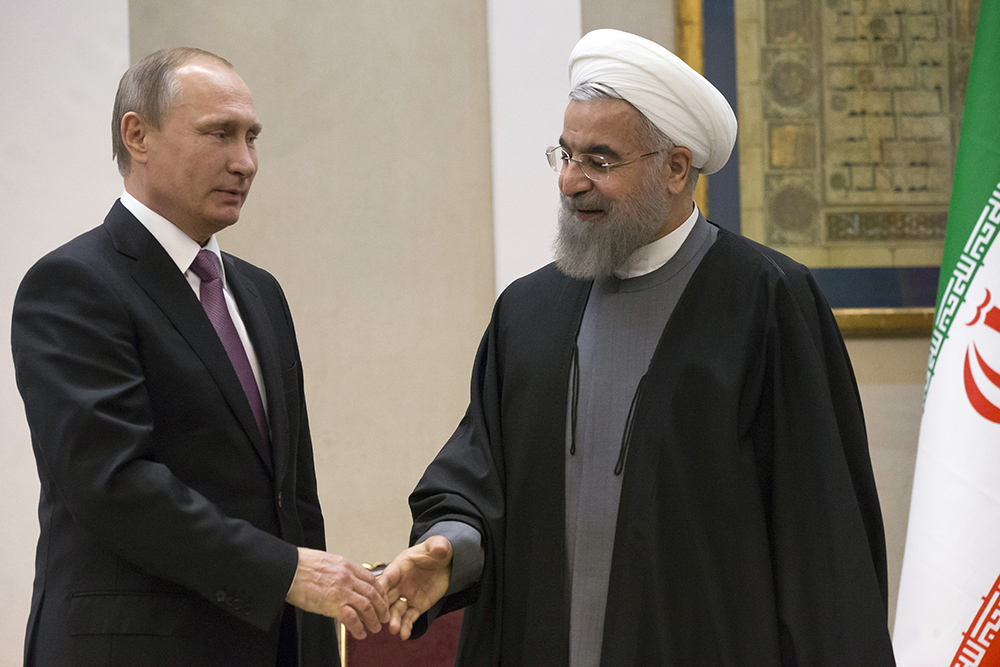
Russian President Vladimir Putin, shown above shaking hands with Iranian President Hassan Rouhani, has shown a willingness to exploit weakness and indecision in the West. (AP)
Or for that matter with China, whose much smaller nuclear arsenal is enough to deter superpower America.
“The greatest single flaw in current U.S. military strategy is that we have no response to a Russian or Chinese nuclear attack. It doesn’t matter whether the attack is deliberate or accidental, whether it’s big or small, we don’t have an answer,” said Loren Thompson, COO of the conservative Lexington Institute.
“If Trump wanted to change the strategic landscape, nothing he does could have a greater impact than getting serious about national missile defense.”
Tom Donnelly of the American Enterprise Institute agrees the best offense is often a better defense.
“In Europe, we need to restore a robust conventional deterrent to Russia’s provocations from the Baltic to the Black Sea; similarly to China’s creeping claims, particularly in the South China Sea. Kim Jong-un’s erratic behavior and North Korea’s nuclear and missile programs require not only a better deterrent but improved missile defenses, not only across the region but in the United States proper,” Donnelly said.
And analysts also suggest that Trump’s instinct to confront China economically rather than militarily is the smart way to go.
“China respects strength and by letting them take advantage of us economically, which they are doing like never before, we have lost all of their respect,” Trump said in his April speech.
China is neither a military nor an economic powerhouse, Ullman argued.
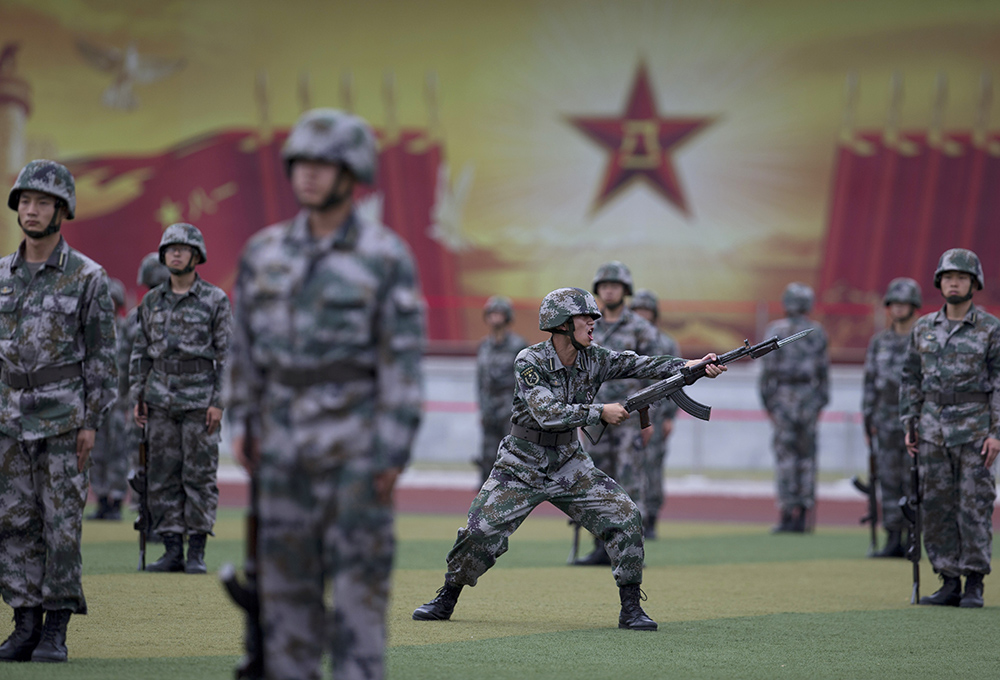
China is neither a military nor an economic powerhouse, said Military analyst Harlan Ullman. (AP)
“The Chinese have an extraordinary internal problem of possibly half-a-billion people living below the poverty line. Their economy is not in good shape, it’s not growing at the rate it needs to and their real estate bubble and internal debt is really going to cause them huge problems.”
That, he said, makes China vulnerable to economic pressure, so Ullman would advise downplaying China’s build-up in the South China Sea while engaging them economically.
Continue freedom of navigation flights and ship passages, he says, but emphasize that it’s the economy that matters.
“I would continue to protest the militarization, but I would make the point with China that their domestic economy is really far more important, and if they continue these efforts it’s not going to be very, very helpful.”
U.S. leadership The consensus of national security experts was that putting America’s interests first, as Trump has espoused, does not mean exiting the international stage and leaving the other players to their own devices.
American leadership and engagement, they agree, remains vital to protecting those interests, whether it is defeating the murderous Islamic State or thwarting a revanchist Russia.
“A new president will have to begin to reverse the disastrous retreats of the Obama years across the Middle East, reassuring our past allies — who, in cases like Saudi Arabia in Yemen, are compounding the region’s problems — and pushing back against Iran’s drive for dominance,” Donnelly said. “In all these situations, any policy is doomed to failure absent a more powerful and persistent American military posture.”
Deptula said the next president needs to reject what he sees as eight years of detachment by Obama.
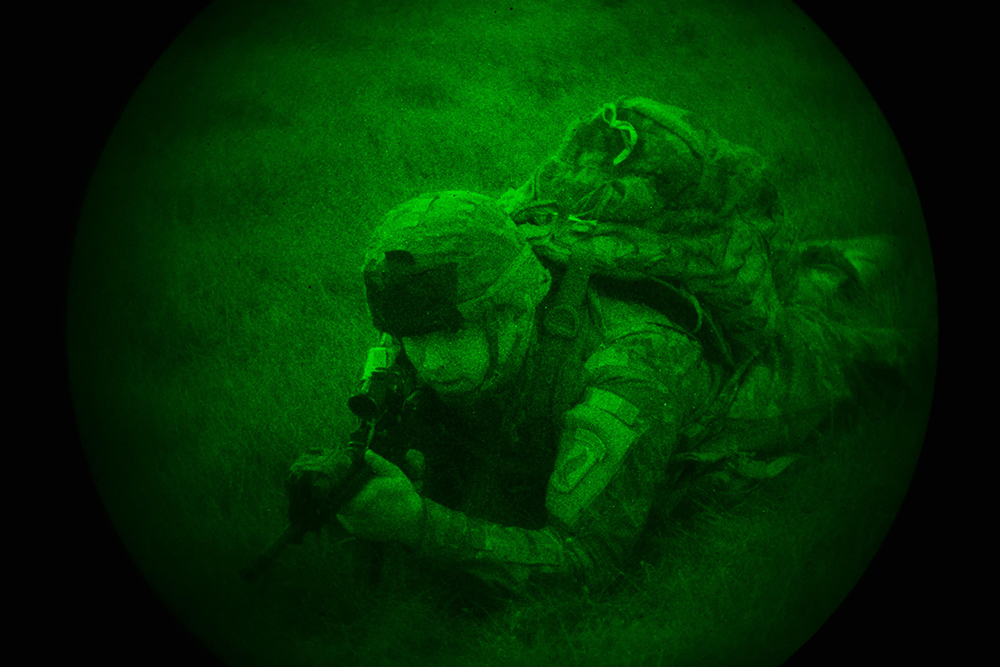
Mackenzie Eaglen, an analyst with the American Enterprise Institute, said she expects the Republican Party to grow the active-duty Army, though she said all services could benefit from more personnel. (U.S. Army)
“If the U.S. is to maintain its position as the world’s sole superpower — for the purpose of assuring U.S. security, and then for the purpose of setting the conditions for peace and stability around the world — then they should consider reversing the Obama administration’s grand strategy of “disengagement.’ ”
“We face a complex series of security challenges today and they will only grow in the future,” Deptula said. “The U.S. must take the lead in shaping security policy to deal with each of these issues in the context of U.S. security interests.”
Or as Trump put it back in April: “The world is most peaceful and most prosperous when America is strongest.”
